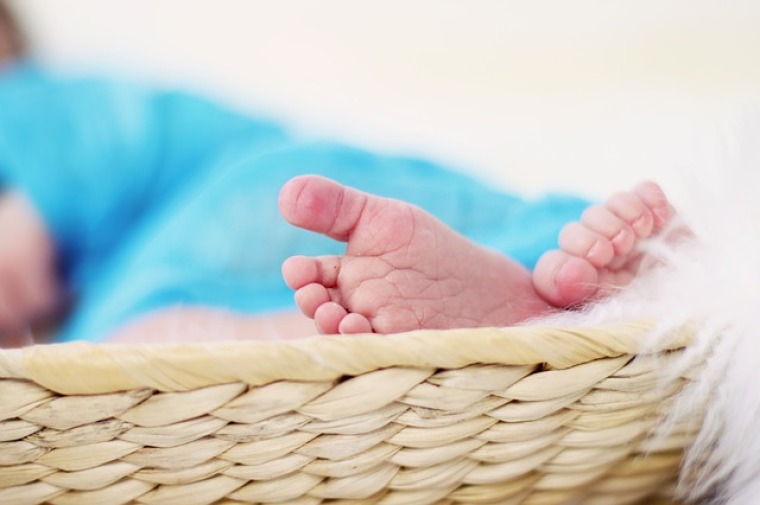Canadian baby may be first child to be registered as gender 'unknown' in official documents

An eight-month-old Canadian baby, who is biologically female, may be the first child to be issued with a government health card marked with gender "unknown."
Searyl Atli, who was born in the Canadian province of British Columbia, will have a health card marked with "U," presumably for "unknown" or "unspecified," in place of "M" or "F."
The child's parent, Kori Doty, who does not identify as either male or female, prefers to keep the baby's gender off all official records. However, the baby is still listed as female in the birth certificate, according to Heat Street.
Doty, who prefers to use the pronoun "they" instead of "he" or "she," said that the baby will be raised genderless until the child has a "sense of self and command of vocabulary to tell me who they are."
"I'm recognising them as a baby and trying to give them all the love and support to be the most whole person that they can be outside of the restrictions that come with the boy box and the girl box," Doty said.
According to Yahoo News UK, British Columbia has refused Doty's request to issue the child's birth certificate without a gender marker.
Doty's lawyer has noted that the province only accommodates a male or female gender designation in its birth certificates at the moment.
However, some provinces in Canada are reviewing their policies to include a third, non-binary gender option on official documents.
In Alberta, residents are allowed to put an "X" as a gender marker on birth certificates and other official documents, while Ontario offers gender-neutral health cards and driver's licenses, and plans to extend the policy to birth certificates next year.
Doty, who sports a mustache and a stubble, expressed concern that those who use the third option could be targeted for discrimination and hate crimes.
The parent, along with the British Columbia Human Rights Tribunal, has argued that the ommission of gender should apply to all government documents for everyone in British Columbia as well as in Canada.
Doty noted that having to change the gender in government documents later in life is often a difficult process.
"When I was born, doctors looked at my genitals and made assumptions about who I would be, and those assignments followed me and followed my identification throughout my life," Doty remarked.
"Those assumptions were incorrect, and I ended up having to do a lot of adjustments since then," the parent added.
 Christians don't have to affirm transgenderism, but they can’t express that view at work: tribunal
Christians don't have to affirm transgenderism, but they can’t express that view at work: tribunal Archaeology discovery: Medieval Christian prayer beads found on Holy Island
Archaeology discovery: Medieval Christian prayer beads found on Holy Island Presbyterian Church in America votes to leave National Association of Evangelicals
Presbyterian Church in America votes to leave National Association of Evangelicals Over 50 killed in 'vile and satanic' attack at Nigerian church on Pentecost Sunday
Over 50 killed in 'vile and satanic' attack at Nigerian church on Pentecost Sunday Ukrainian Orthodox Church severs ties with Moscow over Patriarch Kirill's support for Putin's war
Ukrainian Orthodox Church severs ties with Moscow over Patriarch Kirill's support for Putin's war Islamic State kills 20 Nigerian Christians as revenge for US airstrike
Islamic State kills 20 Nigerian Christians as revenge for US airstrike Man who served 33 years in prison for murder leads inmates to Christ
Man who served 33 years in prison for murder leads inmates to Christ


 Nigerian student beaten to death, body burned over ‘blasphemous’ WhatsApp message
Nigerian student beaten to death, body burned over ‘blasphemous’ WhatsApp message 'A new low': World reacts after Hong Kong arrests 90-year-old Cardinal Joseph Zen
'A new low': World reacts after Hong Kong arrests 90-year-old Cardinal Joseph Zen Iran sentences Christian man to 10 years in prison for hosting house church worship gathering
Iran sentences Christian man to 10 years in prison for hosting house church worship gathering French Guyana: Pastor shot dead, church set on fire after meeting delegation of Evangelicals
French Guyana: Pastor shot dead, church set on fire after meeting delegation of Evangelicals ‘Talking Jesus’ report finds only 6% of UK adults identify as practicing Christians
‘Talking Jesus’ report finds only 6% of UK adults identify as practicing Christians Mission Eurasia ministry center blown up in Ukraine, hundreds of Bibles destroyed: 'God will provide'
Mission Eurasia ministry center blown up in Ukraine, hundreds of Bibles destroyed: 'God will provide' Church holds service for first time after ISIS desecrated it 8 years ago
Church holds service for first time after ISIS desecrated it 8 years ago Burger King apologizes for 'offensive campaign' using Jesus' words at the Last Supper
Burger King apologizes for 'offensive campaign' using Jesus' words at the Last Supper Uganda: Muslims abduct teacher, burn him inside mosque for praying in Christ’s name
Uganda: Muslims abduct teacher, burn him inside mosque for praying in Christ’s name